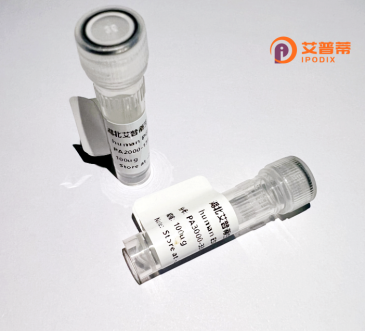
| 纯度 | >90%SDS-PAGE. |
| 种属 | Human |
| 靶点 | CSPG2 |
| Uniprot No | P13611 |
| 内毒素 | < 0.01EU/μg |
| 表达宿主 | E.coli |
| 表达区间 | 1-354aa |
| 氨基酸序列 | MFINIKSILWMCSTLIVTHALHKVKVGKSPPVRGSLSGKVSLPCHFSTMPTLPPSYNTSEFLRIKWSKIEVDKNGKDLKETTVLVAQNGNIKIGQDYKGRVSVPTHPEAVGDASLTVVKLLASDAGLYRCDVMYGIEDTQDTVSLTVDGVVFHYRAATSRYTLNFEAAQKACLDVGAVIATPEQLFAAYEDGFEQCDAGWLADQTVRYPIRAPRVGCYGDKMGKAGVRTYGFRSPQETYDVYCYVDHLDGDVFHLTVPSKFTFEEAAKECENQDARLATVGELQAAWRNGFDQCDYGWLSDASVRHPVTVARAQCGGGLLGVRTLYRFENQTGFPPPDSRFDAYCFKRKCLIPF |
| 分子量 | 65.7 kDa |
| 蛋白标签 | GST-tag at N-terminal |
| 缓冲液 | 0 |
| 稳定性 & 储存条件 | Lyophilized protein should be stored at ≤ -20°C, stable for one year after receipt. Reconstituted protein solution can be stored at 2-8°C for 2-7 days. Aliquots of reconstituted samples are stable at ≤ -20°C for 3 months. |
| 复溶 | Always centrifuge tubes before opening.Do not mix by vortex or pipetting. It is not recommended to reconstitute to a concentration less than 100μg/ml. Dissolve the lyophilized protein in distilled water. Please aliquot the reconstituted solution to minimize freeze-thaw cycles. |
1. **"Recombinant human versican G1 domain inhibits cell proliferation and migration"**
**作者:** Yamagata M et al.
**摘要:** 该研究利用哺乳动物细胞表达重组人Versican(CSPG2)的G1结构域,发现其通过阻断细胞-基质相互作用抑制了多种肿瘤细胞的增殖和迁移,表明其在调控肿瘤微环境中的潜在作用。
2. **"Expression and functional analysis of recombinant chondroitin sulfate proteoglycan 2 in cardiovascular remodeling"**
**作者:** Wight TN et al.
**摘要:** 通过昆虫杆状病毒系统表达重组人CSPG2.揭示其通过调节细胞外基质弹性影响血管平滑肌细胞表型转化,与动脉粥样硬化和血管重塑的病理机制相关。
3. **"Versican modulates stress fiber formation and immune response in macrophages"**
**作者:** Kim S et al.
**摘要:** 研究采用原核和真核系统重组表达CSPG2蛋白片段,证明其通过激活TLR2信号通路增强巨噬细胞炎症反应,并调控细胞骨架重组,提示其在炎症性疾病中的作用。
4. **"Recombinant versican V1 isoform induces neuronal differentiation via CD44 receptor"**
**作者:** Zhang Y et al.
**摘要:** 通过HEK293细胞表达人源重组Versican V1亚型,发现其与神经元表面CD44受体结合激活ERK通路,促进神经干细胞向成熟神经元分化,为神经再生研究提供新靶点。
Versican, encoded by the human *CSPG2* gene, is a large chondroitin sulfate proteoglycan essential to the extracellular matrix (ECM). As a member of the lectican family, it regulates cell adhesion, migration, and proliferation by interacting with hyaluronan, collagens, and cell surface receptors. Structurally, its central glycosaminoglycan-binding domain flanked by globular N- (G1) and C-terminal (G3) domains enables versatile ECM remodeling. Versican is critical during embryogenesis, particularly in cardiovascular and nervous system development, and contributes to adult tissue homeostasis, wound healing, and inflammatory responses. Its isoforms (V0–V3), generated via alternative splicing, exhibit tissue-specific functions. Dysregulation is implicated in pathologies: overexpression promotes cancer metastasis, atherosclerosis, and fibrosis by enhancing ECM stiffness and cell invasion. Recombinant human CSPG2 protein, typically produced in mammalian systems (e.g., HEK293 or CHO cells), retains post-translational modifications for functional studies. Researchers utilize it to investigate ECM dynamics, cellular signaling pathways, and therapeutic targets. In regenerative medicine, it aids in designing biomimetic scaffolds, while in cancer research, it helps decipher metastasis mechanisms. Its role in modulating immune responses also makes it relevant for studying chronic inflammation and autoimmune diseases. Overall, recombinant CSPG2 serves as a vital tool to explore ECM biology and its disease associations.
×